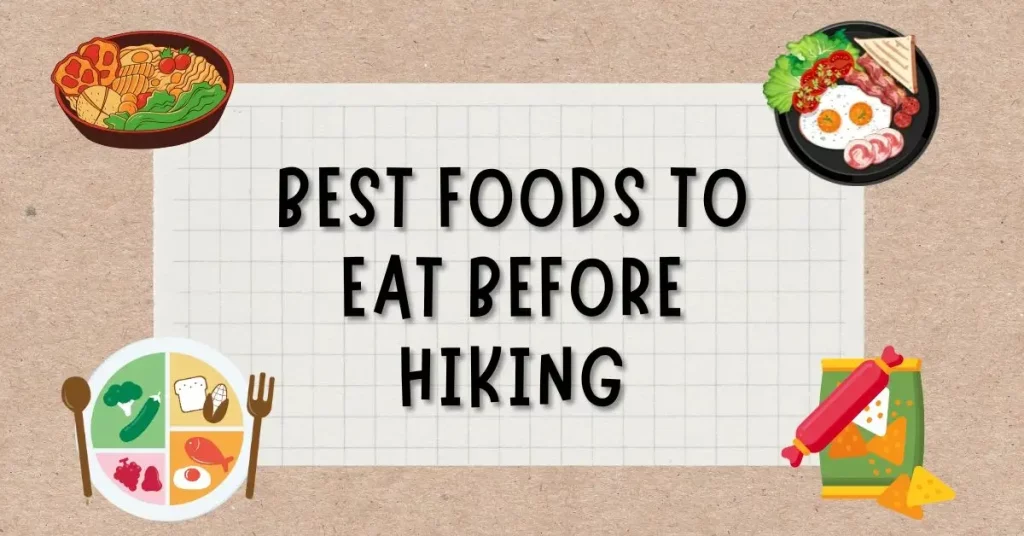Are you planning a hiking adventure and wondering what to eat before hiking? Fueling your body with the correct foods is crucial for a successful and enjoyable hike. Especially when considering what to eat before going hiking. Whether venturing into the mountains or exploring a nearby trail, choosing the appropriate pre-hike meal is essential. The foods you consume before hiking should provide sustained energy, promote hydration, and be easily digestible. A meal with complex carbohydrates, lean proteins, and healthy fats is recommended.
In this article, we will explore some nutritious options to consider before your hiking journey,
ensuring you’re adequately prepared for the challenges.
Preparing For A Hike
Before we delve into the specifics of pre-hike nutrition, let’s first understand the energy requirements involved in hiking. Hiking involves continuous physical activity, which demands fuel for sustained performance. The food you eat before hitting the trails provides energy and nutrients.
Pre-Hike Meal Planning
When planning your pre-hike meal, it’s important to consider the essential nutrients your body needs for energy and endurance. Carbohydrates, proteins, and healthy fats are all vital components of a well-rounded pre-hike meal. Carbohydrates serve as the primary fuel source, proteins aid in muscle repair and recovery, and healthy fats provide sustained energy.
Bonus:
How To Attach Hiking Poles To Backpack?
Best Foods to Eat Before Hiking

- Sandwiches for Hiking: Sandwiches are a versatile and convenient option for pre-hike meals. Choose whole-grain bread and fill it with lean proteins, such as turkey or chicken, and nutrient-packed vegetables like spinach and tomatoes. This combination balances carbohydrates, proteins, and essential vitamins and minerals.
- Backpacking Eggs for Sustained Energy: Eggs are a nutritional powerhouse and an excellent choice for hikers. They are rich in high-quality protein, essential amino acids, and healthy fats. Hard-boiled eggs can be easily prepared and packed, providing a portable and nutritious snack.
- Backpacking Oatmeal for a Filling Breakfast: Oatmeal is a great breakfast option before a hike. It is rich in complex carbohydrates, fibre, and essential nutrients. Oatmeal provides a steady release of energy, keeping you fueled throughout your trek. To elevate the nutritional content, consider incorporating toppings such as seeds, nuts and dried fruits to enhance the taste and nutrient profile.
- High-Protein Options for Muscle Recovery: Including high-protein foods in your pre-hike meal can aid in muscle recovery and provide sustained energy. Consider options like grilled chicken, lean beef, or plant-based protein sources like tofu or tempeh. Pair them with whole grains and vegetables for a well-rounded meal.
- Overcoming the Challenges of Eating Yogurt at Night: Yogurt is a nutritious snack, but some hikers may need help to consume it at night due to its perishable nature. To overcome this challenge, consider packing freeze-dried or powdered yoghurt that can be rehydrated on the trail. By following this approach, you can still relish the benefits of yoghurt without concerns about spoilage.
Ideal Snacks for Hiking
In addition to your pre-hike meal, you must pack high-energy snacks to keep you fueled throughout your adventure. Here are some top choices:
- High-Energy Snacks for Quick Boosts: Snacks like trail mix, energy bars, and jerky are excellent choices for quick energy boosts. Look for options that contain a mix of nuts, dried fruits, and seeds to provide a combination of carbohydrates, healthy fats, and proteins.
- Nuts and Dried Fruits for Sustained Energy: Almonds, walnuts, cashews, and dried fruits like raisins and apricots are lightweight, portable, and provide a good energy source. They are packed with nutrients, including healthy fats and antioxidants.
- Energy Bars and Granola for Convenience: Energy bars and granola bars are compact, easy to carry, and offer a convenient energy source. Look for bars low in added sugars and rich in whole grains, nuts, and seeds for sustained energy release.
Timing Your Pre-Hike Meal
Finding the right timing for your pre-hike meal is crucial for optimal digestion and energy levels. Consider the following factors:
- Balancing Timing and Digestion: Eating meals 2-3 hours before your hike is recommended for proper digestion. This timeframe allows your body to absorb nutrients efficiently without causing discomfort.
- Light Meals vs Heavier Meals: The main difference between light meals and heavier meals is that If you have less time before your hike. Opt for a lighter meal or snack that is easier to digest. A heavy meal may cause sluggishness and discomfort during physical activity.
What to Avoid Before Hiking?
While it’s important to focus on what to eat before hiking, it’s equally important to be aware of foods to avoid. Here are some items to avoid or stay away from:
- Foods That May Cause Digestive Issues: Avoid foods that cause bloating, gas, or stomach discomforts, such as beans, cabbage, and spicy foods. Opt for easily digestible options to prevent digestive disturbances on the trail.
- High-Fat and Greasy Foods: Heavy, greasy foods can slow digestion and make you feel lethargic. Before your hike, avoid fried foods and fatty meals to maintain optimal energy levels.
- Caffeine and Alcohol: Caffeine and alcohol can dehydrate the body, which is not ideal for a physically demanding activity like hiking. Limit your consumption of coffee, tea, and alcohol before your hike to stay hydrated. For more ideas, visit my Pinterest.
Post-Hike Nutrition
After a long and rewarding hike, it’s crucial to replenish your body’s energy stores and support muscle recovery. Consider the following post-hike nutrition tips:
- Replenishing the body’s energy stores: After a hike, it’s crucial to refuel your body with a well-balanced meal or snack. Focus on replenishing carbohydrates to restore glycogen stores and proteins to aid muscle recovery. Some post-hike meal ideas include a lean protein source like grilled chicken or fish, whole grains like quinoa or brown rice and various vegetables.
- Importance of Protein for Muscle Recovery: Protein is crucial in repairing and rebuilding muscles after physical activity. Include protein-rich foods such as poultry, lean meats, fish, legumes, and dairy products in your post-hike meal. Additionally, consider incorporating a protein shake or smoothie with ingredients like Greek yoghurt, fruits, and protein powder for a quick and convenient option.
Conclusion
Proper nutrition before hiking is essential for fueling your body and optimizing your performance on the trails. Be sure to plan your pre-hike meals and snacks carefully, focusing on a balance of carbohydrates, proteins, and healthy fats. Choose foods that provide sustained energy, aid muscle recovery, and are easy to digest. Stay hydrated throughout your hike and replenish your body’s energy stores with a nutritious post-hike meal. You can enhance your hiking experience and maximise outdoor adventures by prioritising your nutrition.
FAQs
Q.1 What to eat for breakfast before a hike?
Ans: For breakfast before a hike, choose a balanced meal with carbohydrates, protein, and healthy fats, such as oatmeal with nuts and fruits.
Q.2 Can I eat fast food before hiking?
Ans: It’s best to avoid fast food before hiking as it tends to be high in unhealthy fats and sodium and low in nutritional value. Opt for wholesome, nutrient-dense meals and snacks instead.
Q.3 Should I take supplements before a hike?
Ans: Getting your nutrients from whole foods is always best. Some hikers may benefit from certain supplements. Consult with healthcare experts or a registered dietitian to determine if supplements are necessary.
Q.4 How long should I beat a short hike?
Ans: The duration of a short hike can vary depending on the trail and individual fitness levels. It can range from 30 minutes to a few hours. Choose a hike that suits your preferences and time availability.
Q.5 What should I eat after a long hike?
Ans: After a long hike, focus on replenishing your body with a balanced meal with carbohydrates, proteins, and vegetables. Lean proteins, whole grains, and fruits and vegetables are excellent choices for post-hike nutrition.
Q.6 Why is yoghurt night so difficult?
Ans: Yogurt night can be difficult due to its texture, lack of variety, and potential messiness, making it less appealing for some.
Bonus:

